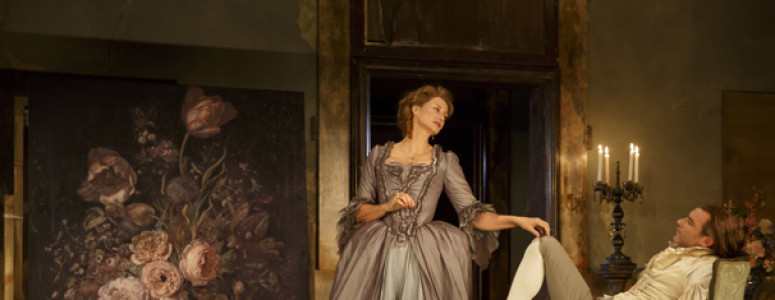To paraphrase Shakespeare: two novels, unalike in origin, are on our stages as plays. One is a Broadway revival adapted from Pierre Ambroise François Choderlos de Laclos’ late-18th century classic LES LIAISONS DANGERUESES; the other is a new off-Broadway drama taken from John Fowles mid-20th century work THE COLLECTOR.
Each doesn’t do much to make us proud of our fellow man.
In the case of Christopher Hampton’s LES LIAISONS adaptation, we also can’t be proud of at least one woman: La Marquise de Merteuil who’s into “making mischief,” to cite the underwhelming way she puts it. Her mission, should Le Vicomte de Valmont care to accept it, is to have him seduce the marred-and-in-love Madame de Tourvel. Meanwhile, La Marquise will be busy encouraging Cecile, a young teenager, to have sex with Valmont and forget her love for Le Chevalier Danceny, her age-appropriate tutor.
Many properties have depended on a bet, such as the GUYS AND DOLLS wager in which Sky Masterson is challenged to get Sarah Brown to Havana. Here no money’s at stake, for these people are just malevolent for the fun of it.
So many times, entrance applause isn’t fairly apportioned. Liev Schreiber gets it, Janet McTeer doesn’t. Oh, well; the audience always recognizes those who have done more movies, and Schreiber has literally filmed twice as many as she: 46 to her 23). Considering that they take their curtain call together and neither Schreiber nor McTeer steps in front for a single one, we’ll never know for certain whom the audience appreciates more.
Here’s betting it’s McTeer. She has all the evil and elegance that Glenn Close displayed in the 1988 film, but offers more charm and even some vulnerability near play’s end. Old-time British film fans may notice that she rather resembles and sounds much like Joan Greenwood.
Schreiber, with his semi-Dracula hairdo, either underplays Valmont or is at sea as the unlovable rogue. He doesn’t project enough good looks and charisma, although he has more of both than John Malkovich possessed in the aforementioned movie. Luckily, Schreiber heats up a bit during Act Two.
As Valmont’s initially difficult but eventually easy prey, Birgitte Hjort Sorensen is a stunning Madame de Tourvel. Elena Kampouris overdoes Cecile and Raffi Barsoumian is too much of a fop as her beau. Although the script calls for “suggestions of great opulence,” Tom Scutt’s set is almost as distressed as Act Two of GREY GARDENS. Josie Rourke’s direction is hardly distressed, however, for she manages to mask that the evening is nearly three hours long.
But what does it say about us that we laugh at so many of the play’s lines and situations? True, when statutory rape and unmarried pregnancy enter the plot, the audience’s laughter subsides – but only for a while. I’m reminded of what Clive Barnes wrote when reviewing the 40th play of the 1967-68 season: “There is something for everyone to detest in Joe Orton’s outrageous play LOOT … To like it, I think you might have to have a twisted sense of humor … But I do trust it’s not for you, for you would be a far nicer person if it were not.”
This assessment applies much more to LES LIAISONS DANGEREUSES.
Fourteen streets and four avenues away at 59E59, we encounter one of Britain’s favorite topics – class distinction – in a most atypical way. John Fowles created the workaday Frederick Clegg who becomes entranced by Miranda Grey, a daughter of wealth who’s beautiful to boot. She’s too far above him – so he takes her below and into his basement after chloroforming her. Luckily, he just came into some serious lottery money and could buy this out-of-the-way house where no one will hear her screams.
“People would do this more often if they had the time or money,” he rationalizes.
Well, maybe, but wouldn’t you prefer to think otherwise? As Frederick narrates, he wants us to take his side. Now in most films and plays with Narrators, we’re usually with them, or at the very least neutral. But here we can’t be.
This puts quite a strain on actor Matt De Rogatis, who’s in a very small thrust-stage space with the audience cornering him on three sides. How hard he works in trying to convince us not to be judgmental. “There are two sides to every story,” he insists, and while there are, n-o-t-h-i-n-g he can say will make us believe he did the right thing.
In a novel, this is less a problem, for there we never actually “meet” the perpetrator and are by the very nature of the medium automatically distanced from him. When he’s right there in front of us in flesh-and-blood, however, we want to get away from this pathetic creep.
Fowles wrote THE COLLECTOR in 1963. Mark Healy has set this version in the present day, adding cell phones, CDs and such expressions as “No way!” The updating is a mistake, because the young lady of 1963 was far less savvy than today’s woman. Although Miranda does make concerted efforts to escape, actress Jillian Geurts is saddled with a character who’s too passive and victimized to be a convincing 2106 woman. Today Miranda would know much more about such a milquetoast’s personality and would turn the tables on him. In what will undoubtedly be my most cynical-slash-controversial thought of the season, a 21st century Miranda would realize that Frederick is ripe for his own victimization and would turn herself into an on-the-spot dominatrix.
And, my, would THE COLLECTOR be more interesting then.




